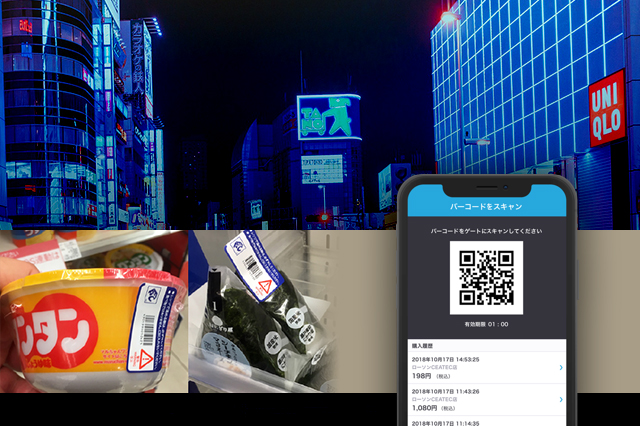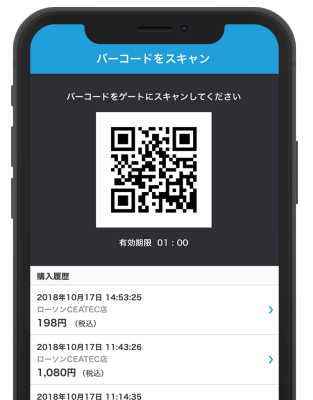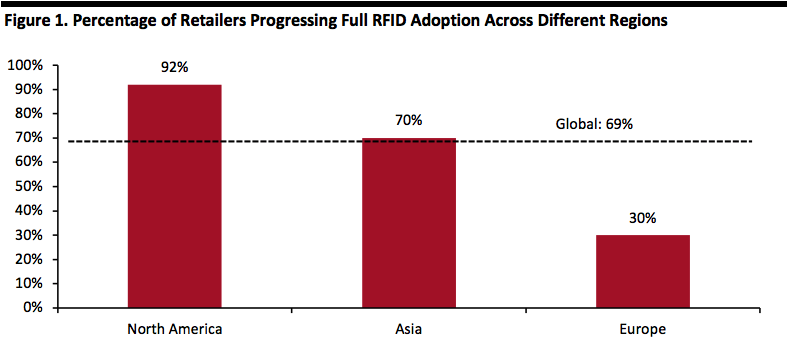
Nitheesh NH
In many countries, convenience stores are undergoing digital transformation, and one major trend is the emergence of unstaffed formats — discussed in our recent report Convenience Stores — As Consumers Seek Ever More Convenience, Digitalization Prevails.
Here, we focus on Japan’s bold ambitions for five convenience-store chains to automating 50,000 stores by 2025 using Radio Frequency Identification (RFID) technology.
Japanese Government Aims to Combat Workforce Shortage and Increase Operational Efficiency
Japan’s Ministry of Economy, Trade and Industry (METI) launched a project in 2017 to increase the operational efficiency of convenience stores, to bring some relief to the country’s workforce shortage and rising labor costs due to the country’s low birth rate, increased life expectancy and dearth of meaningful immigration. METI made a deal with five major convenience store chains (Seven-Eleven Japan, FamilyMart, Lawson, Ministop and New Days) to do the following by 2025:
 Examples of Products with RFID tags in Lawson
Examples of Products with RFID tags in Lawson
Source: Company website[/caption] But this progress will not come cheap: Successful implementation across 50,000 stores will cost up to 100 billion (US$847 million), according to METI. METI will support technological development through grants to convenience-store retailers. After implementation, METI hopes to extend RFID-based automated systems to drugstores and supermarkets. Lawson Demonstrates a Walk-Through Payment System with RFID Technology In October 2018, Lawson demonstrated efforts to build a self-checkout system by showcasing its cashier-less “walk-through payment” system at the Ceatec Japan 2018 Technology Trade Fair. To use the service, customers must first enter credit card information into a smartphone app, which generates a unique QR code. Once shoppers have bagged all items, they place their smartphone over a QR code reader and pass the bag through a merchandise sensor that reads RFID tags as they exit the store. Items labeled with RFID tags can all be simultaneously recognized by the sensor. The purchase is automatically charged to the buyer’s credit card, and after payment is taken, the receipt is displayed on their smartphone screen. [caption id="attachment_80171" align="aligncenter" width="313"] An example of a unique QR code generated for a Lawson customer.
An example of a unique QR code generated for a Lawson customer.
Source: Company website[/caption] RFID Implementation Benefits Convenience Stores from Supply Chain to Customer Experience Compared with barcodes, which customers have to scan at close range, RFID can be read at greater distance through electromagnetic fields. In terms of benefits to convenience stores, product information contained in the RFID tags, such as location, stock levels and expiry dates can be viewed remotely, allowing better adjustment of capacity and sales plans, easing convenience store operators’ inventory-related workload. RFID can also help retailers minimize product wastage by automatically discounting items approaching their expiration date. For customers, this means a more seamless checkout experience. A study in the US by Forrester Research and Digimarc in 2018 reveals that shoppers consider checkout experience and length of the checkout line as very important, and these factors influence the shopping decisions of almost 40% of shoppers who are not loyal to a single grocery location. Retailers Can Use RFID Adoption to Improve Service and Business So, how widely RFID is being deployed by retailers? In a study by Accenture called Transforming Modern Retail: Findings of the 2018 RFID in Retail Study, 69% of surveyed retailers across North America, Asia and Europe are turning to RFID to ensure they have both inventory accuracy and visibility. The report asserts RFID can deliver superior customer service, enhance personalized marketing, improve operating profits and decrease incidences of items being out of stock. [caption id="attachment_80172" align="aligncenter" width="620"] Source: Accenture RFID Retail Study 2018/Coresight Research[/caption]
Fully 92% of North American retailers and 70% of Asian retailers report they are progressing toward full adoption of RFID, followed by European retailers (the lowest adoption rate) at 30%, according to Accenture.
Key Insights
For supermarkets and convenience stores, RFID can improve the customer experience by reducing or eliminating checkout time – and the technology can help retailers improve operational efficiency in inventory accuracy and visibility, and decrease incidences of items being out of stock.
Source: Accenture RFID Retail Study 2018/Coresight Research[/caption]
Fully 92% of North American retailers and 70% of Asian retailers report they are progressing toward full adoption of RFID, followed by European retailers (the lowest adoption rate) at 30%, according to Accenture.
Key Insights
For supermarkets and convenience stores, RFID can improve the customer experience by reducing or eliminating checkout time – and the technology can help retailers improve operational efficiency in inventory accuracy and visibility, and decrease incidences of items being out of stock.
- Introduce RFID tags for all products, estimated to be 100 billion products annually.
- Introduce automated self-checkout registers enabled with RFID technology to read the RFID tags.
- Share certain information from these tags to supply chain companies.
 Examples of Products with RFID tags in Lawson
Examples of Products with RFID tags in LawsonSource: Company website[/caption] But this progress will not come cheap: Successful implementation across 50,000 stores will cost up to 100 billion (US$847 million), according to METI. METI will support technological development through grants to convenience-store retailers. After implementation, METI hopes to extend RFID-based automated systems to drugstores and supermarkets. Lawson Demonstrates a Walk-Through Payment System with RFID Technology In October 2018, Lawson demonstrated efforts to build a self-checkout system by showcasing its cashier-less “walk-through payment” system at the Ceatec Japan 2018 Technology Trade Fair. To use the service, customers must first enter credit card information into a smartphone app, which generates a unique QR code. Once shoppers have bagged all items, they place their smartphone over a QR code reader and pass the bag through a merchandise sensor that reads RFID tags as they exit the store. Items labeled with RFID tags can all be simultaneously recognized by the sensor. The purchase is automatically charged to the buyer’s credit card, and after payment is taken, the receipt is displayed on their smartphone screen. [caption id="attachment_80171" align="aligncenter" width="313"]
 An example of a unique QR code generated for a Lawson customer.
An example of a unique QR code generated for a Lawson customer.Source: Company website[/caption] RFID Implementation Benefits Convenience Stores from Supply Chain to Customer Experience Compared with barcodes, which customers have to scan at close range, RFID can be read at greater distance through electromagnetic fields. In terms of benefits to convenience stores, product information contained in the RFID tags, such as location, stock levels and expiry dates can be viewed remotely, allowing better adjustment of capacity and sales plans, easing convenience store operators’ inventory-related workload. RFID can also help retailers minimize product wastage by automatically discounting items approaching their expiration date. For customers, this means a more seamless checkout experience. A study in the US by Forrester Research and Digimarc in 2018 reveals that shoppers consider checkout experience and length of the checkout line as very important, and these factors influence the shopping decisions of almost 40% of shoppers who are not loyal to a single grocery location. Retailers Can Use RFID Adoption to Improve Service and Business So, how widely RFID is being deployed by retailers? In a study by Accenture called Transforming Modern Retail: Findings of the 2018 RFID in Retail Study, 69% of surveyed retailers across North America, Asia and Europe are turning to RFID to ensure they have both inventory accuracy and visibility. The report asserts RFID can deliver superior customer service, enhance personalized marketing, improve operating profits and decrease incidences of items being out of stock. [caption id="attachment_80172" align="aligncenter" width="620"]
 Source: Accenture RFID Retail Study 2018/Coresight Research[/caption]
Fully 92% of North American retailers and 70% of Asian retailers report they are progressing toward full adoption of RFID, followed by European retailers (the lowest adoption rate) at 30%, according to Accenture.
Key Insights
For supermarkets and convenience stores, RFID can improve the customer experience by reducing or eliminating checkout time – and the technology can help retailers improve operational efficiency in inventory accuracy and visibility, and decrease incidences of items being out of stock.
Source: Accenture RFID Retail Study 2018/Coresight Research[/caption]
Fully 92% of North American retailers and 70% of Asian retailers report they are progressing toward full adoption of RFID, followed by European retailers (the lowest adoption rate) at 30%, according to Accenture.
Key Insights
For supermarkets and convenience stores, RFID can improve the customer experience by reducing or eliminating checkout time – and the technology can help retailers improve operational efficiency in inventory accuracy and visibility, and decrease incidences of items being out of stock.